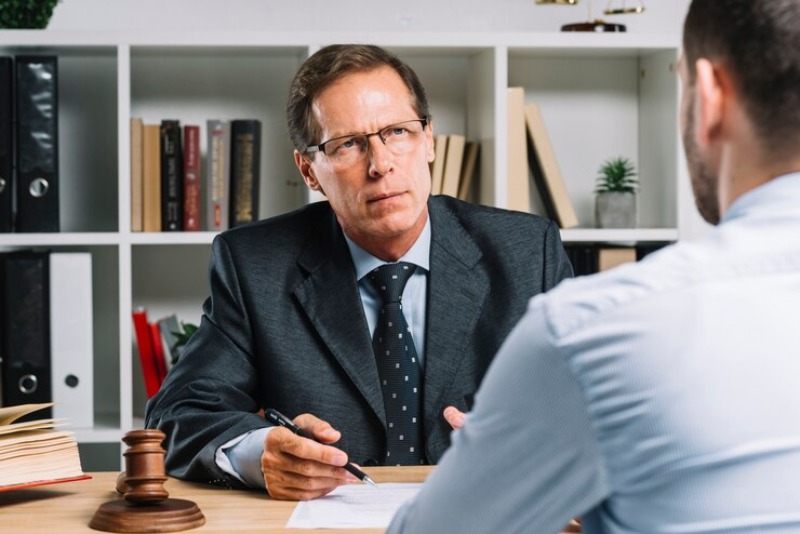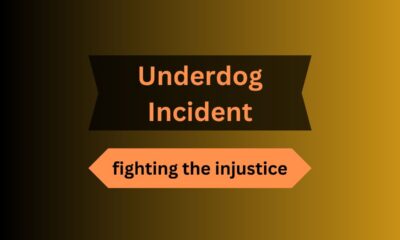Law
What To Look For When Hiring An Immigration Lawyer

The Transactional Records Access Clearinghouse (TRAC) Immigration Project reports that there are over 1.3 million pending immigration cases in US immigration courts, with an average wait time of over 900 days for a hearing.
Due to these lengthy backlogs, it’s highly advisable to look for a qualified and experienced immigration lawyer to help you manage and expedite the process.
Whether you want to get a visa, stay in the country permanently, or defend yourself against possible deportation, your immigration lawyer can help. When selecting a reputable lawyer, you must pay close attention to their qualifications, experience, communication skills, and success rate.
According to an immigration lawyer in NYC, the immigration lawyer that you will hire needs to know your end goal and advise you on the right steps to take to finally become a citizen in the US. Let’s look into the factors involved in finding an immigration expert who can look out for your best interests.
Qualifications and Experience
When choosing an immigration lawyer, you want someone who has worked with immigration cases for at least five years. An attorney who has a solid background in immigration law will be better at handling your case efficiently and effectively.
For instance, for employment-related issues, you might want to choose an employment immigration attorney near you who is well-equipped to handle your employment-related legal needs.
A lawyer with a lot of experience means they’ve likely encountered a range of scenarios, so they can anticipate challenges and come up with creative solutions. Their knowledge of immigration procedures and regulations can make a big difference in how your case turns out.
Communication Skills
In immigration law, clear and concise communication is important. Make sure the immigration lawyer you choose has strong communication skills to help you with your case.
An immigration lawyer with excellent communication skills will be able to explain complex legal concepts in a way that you can understand, keeping you informed and involved throughout the process.
Communication isn’t only about speaking clearly but also about active listening. A good immigration lawyer will listen attentively to your concerns, questions, and goals and make sure they’re being addressed. He or she will keep you updated on the progress of your case, respond fast to your inquiries, and give you realistic expectations about timelines and outcomes.
A lawyer who can articulate arguments persuasively and confidently is a huge help in immigration cases. So choose an immigration lawyer by focusing on their communication skills to make the process easier and more successful.
Track Record of Success
Before hiring an immigration lawyer, you can determine their effectiveness in handling cases like yours through their past cases and success rates. Look for lawyers who’ve handled cases like yours and have a proven track record of getting positive results for their clients.
A successful track record can show that the lawyer has the necessary skills and knowledge to handle immigration law effectively. When checking a lawyer’s experience, look at the types of cases they have handled and whether they’ve successfully helped their clients achieve their immigration goals.
Reviews and testimonials from past clients can also tell you a lot about the lawyer’s abilities and how they handle cases.
Knowledge of Immigration Law
Immigration law is complicated and constantly evolving, so you need a lawyer who stays updated on the latest regulations and policies. A knowledgeable immigration lawyer will be able to assess your situation accurately, give you realistic options that work for you, and help you with the legal processes well.
Understanding immigration law is very important for strategizing the best approach to your case. An experienced lawyer will know which forms to fill out, which documents to gather, and how to present your case persuasively to immigration authorities.
Client Reviews and Testimonials
When choosing an immigration lawyer, read reviews and testimonials to learn about their reputation and past successes. Reading reviews from previous clients can give you useful information about the lawyer’s communication skills, professionalism, and effectiveness in handling immigration cases.
Positive reviews from successful outcomes and satisfied clients can show that the lawyer is experienced and capable of handling the complexities of immigration law.
Negative reviews or testimonials should not be ignored. Pay attention to any problems or warning signs mentioned in many reviews, like the lawyer’s conduct, responsiveness, or competence, because they might indicate problems you might encounter if you choose to work with that lawyer.
By taking the time to review client feedback and testimonials, you can make a more informed decision when choosing an immigration lawyer to handle your case.
Conclusion
When hiring an immigration lawyer, look for someone with the right qualifications, experience, and communication skills. Immigration laws can be complicated and while hiring an immigration lawyer can cost extra, its benefits outweigh the financial aspects of hiring a lawyer.
Law
The Ultimate Guide to Finding the Best Lawyers for Medical Malpractice

Choosing the best lawyers for medical malpractice case can be overwhelming. You might be asking yourself, “What are the reasons to sue a doctor?” It’s important to understand your options and find the best legal help. This guide will walk you through the steps to find a lawyer who has the experience and skills you need.
Don’t let confusion hold you back from seeking justice. Let’s dive in and find the right lawyer for your case!
Evaluate Their Track Record
Evaluating a lawyer’s track record is an important step. Look for a medical malpractice attorney with a history of successful cases. Check if they have won cases similar to yours. A good track record shows they know how to handle complex medical malpractice cases.
Ask about the outcomes of their past cases. A strong track record can give you confidence in their abilities. Always choose a lawyer with proven success in medical malpractice law.
Ask for a Free Consultation
Asking for a free consultation is a smart step when choosing a lawyer. The best medical malpractice lawyers often offer this service. It gives you a chance to discuss your case without any cost. During the consultation, ask about their experience and strategy.
You can also get a feel for their communication style. This meeting helps you decide if they’re the right fit for you. Always take advantage of a free consultation before making your choice.
Evaluate Their Track Record
Evaluating a lawyer’s track record is crucial when hiring one. Look for a birth injury attorney with a history of success in similar cases. A strong track record shows they know how to handle complicated legal situations. Ask about their past case results and how they won.
Review any client feedback to see how they performed in previous cases. A good track record can boost your confidence in their abilities. Always choose a lawyer with a proven history of handling cases like yours.
Look for Clear Communication
Clear communication is essential when choosing a lawyer. You should feel comfortable asking questions. The best lawyers take the time to explain things simply. They avoid legal jargon and make sure you understand. A good lawyer will update you regularly on your case.
They will be easy to reach when you need them. If you don’t understand something, they should explain it again. Choose a lawyer who values clear, open communication.
Review Their Credentials
Reviewing a lawyer’s credentials is an important step. Check if they are licensed to practice law in your state. The best medical malpractice lawyers have certifications in their field. Look for any special training or education related to medical malpractice.
A lawyer with a strong educational background can be more reliable. You should also check if they have membership in professional organizations. A lawyer’s credentials show their dedication to the practice. Always verify their qualifications before making a decision.
Learn More About Best Lawyers for Medical Malpractice
Finding the best lawyers for medical malpractice is key to getting the compensation you deserve. Take your time to research, ask the right questions, and trust your instincts.
A skilled lawyer will guide you through every step of the process. They will fight for your rights and ensure your case is handled properly. Don’t settle for anything less than the best.
Visit our blog for more!
Law
How Personal Injury Lawyers Help Navigate Complex Legal Processes?

Navigating the aftermath of a personal injury can be overwhelming for individuals dealing with physical, emotional, and financial challenges. Beyond recovering from the injury, victims often face a complex legal process involving insurance claims, liability disputes, and potential court proceedings. Personal injury lawyers are critical in guiding individuals through these challenges, ensuring their rights are protected while pursuing fair compensation. We will explore how Brach Eichler Injury Lawyers help clients by simplifying legal complexities, handling negotiations, and advocating for their needs at every stage. Their knowledge and support empower victims to focus on recovery while securing justice.
Understanding and Explaining Legal Rights
One of the primary ways personal injury lawyers assist individuals is by explaining their legal rights in a clear and accessible manner. After an accident, many people need to become more familiar with the laws governing personal injury claims or how liability is determined. Lawyers clarify legal principles, including negligence, comparative fault, and statute limitations. For instance, they can explain whether a victim shares any fault for the accident and how that might impact their compensation. Additionally, they clarify the damages clients may recover, such as medical expenses, lost wages, and pain and suffering. Without this guidance, victims may be unaware of their entitlements or fall prey to misleading information from opposing parties. Personal injury lawyers bridge this gap, ensuring clients fully understand their rights and legal options, which enables them to make informed decisions about their cases.
Gathering Evidence to Strengthen the Case
A crucial part of any personal injury claim is evidence collection, which personal injury lawyers manage with precision and diligence. Building a strong case requires gathering evidence, including medical records, accident reports, witness statements, and photographic documentation. For example, after a car accident, a lawyer might consult with accident reconstruction experts to determine how the collision occurred and who was at fault. Additionally, they ensure medical records and expert testimony demonstrate the full extent of the injury, including long-term impacts on the client’s life. Handling evidence requires careful coordination and adherence to legal standards for admissibility. Lawyers understand what constitutes strong evidence and how to present it effectively to insurance companies or in court. Victims may struggle to collect the necessary proof without their involvement or overlook critical details, weakening their claims. Personal injury lawyers ensure the case is supported by thorough, well-documented evidence that strengthens the pursuit of fair compensation.
Negotiating Fair Compensation with Insurance Companies
Insurance companies are central players in personal injury claims, but their goal is often to minimize payouts to protect their bottom line. Personal injury lawyers act as intermediaries between clients and insurance adjusters, negotiating to secure fair compensation for victims. With representation, individuals may be able to accept low settlement offers, especially when facing financial stress from medical bills or lost income. Lawyers leverage their knowledge of the claim’s value, calculating damages based on medical costs, future treatments, loss of earning potential, and emotional distress. They also counter insurance tactics such as downplaying the severity of injuries or disputing liability. Lawyers present compelling evidence and arguments to challenge these strategies and advocate for the client’s best interests. By handling negotiations, they relieve victims of the stress and uncertainty associated with dealing directly with insurers, ensuring the settlement reflects the true impact of the injury.
Providing Representation in Court When Necessary
While many personal injury claims are resolved through settlement negotiations, some cases require court proceedings to achieve a fair outcome. Personal injury lawyers provide skilled representation, ensuring clients’ cases are presented effectively before a judge or jury. Taking a case to court involves numerous legal procedures, including filing paperwork, pre-trial motions, discovery processes, and presenting arguments during trial. This process can be daunting and prone to mistakes for individuals unfamiliar with legal systems. Lawyers manage these procedural complexities, ensuring deadlines are met, evidence is presented persuasively, and legal arguments align with case law and statutes. They prepare clients for court appearances, cross-examine witnesses, and challenge opposing arguments, all to secure a favorable verdict. Legal representation in court levels the playing field, particularly when facing defendants backed by insurance companies or legal teams. Personal injury lawyers provide the confidence and advocacy clients need when pursuing justice in the courtroom.
Calculating and Pursuing Full Compensation
A critical aspect of personal injury claims is determining the appropriate compensation a victim deserves. Personal injury lawyers excel in calculating both current and future damages to ensure clients receive fair settlements. They evaluate various losses, including medical expenses, property damage, lost wages, and reduced earning capacity. In cases involving severe or long-term injuries, they work with medical professionals and financial experts to estimate the costs of ongoing treatments and rehabilitation. Additionally, personal injury lawyers consider non-economic damages, such as pain and suffering, emotional distress, and diminished quality of life. By factoring in tangible and intangible losses, lawyers ensure that victims are adequately compensated for the full impact of the injury. With this careful calculation, individuals can avoid undervaluing their claims and accepting settlements that fail to meet their needs. Personal injury lawyers advocate for comprehensive compensation, helping clients recover financially while addressing long-term consequences.
Personal injury lawyers are crucial in helping victims navigate the complex legal processes of seeking justice and compensation. From explaining legal rights and gathering evidence to negotiating settlements and providing courtroom representation, they simplify the challenges that accompany personal injury claims. Their involvement ensures that victims understand their options, receive fair compensation, and avoid common pitfalls in the legal process. By managing communication, calculating damages, and offering strategic advice, personal injury lawyers allow clients to focus on healing while ensuring their cases are handled carefully and diligently. Through their dedication and guidance, individuals are better equipped to overcome legal complexities and secure the justice they deserve.
Law
Common Misconceptions About Criminal Defense Lawyers

According to job recruiter Zippia, there are more than 252,159 criminal defense lawyers in the U.S. as of 2023. A criminal defense lawyer plays a vital role in the justice system. They’re advocating for individuals who are dealing with accusations of certain crimes, making sure their rights are protected.
But many people have misconceptions about what these lawyers do and how they operate. For instance, there are some who think that criminal defense lawyer exclusively represent guilty people or that their role is merely to assist clients in escaping consequences.
Criminal defense lawyer Justin L. Ward says that criminal defense lawyers play a crucial role in making sure their clients get a fair trial, advocate for their constitutional rights, and scrutinize the evidence presented against them.
Criminal Defense Lawyers Always Defend Guilty Clients
Many people often believe that criminal defense lawyers only represent clients who are guilty. However, the true purpose of a criminal defense lawyer is not to decide if someone is guilty or innocent, but to ensure that every individual, no matter what they are accused of, gets a fair trial. Criminal defense lawyers stand up for the legal system, questioning the prosecution’s evidence, protecting the rights of those accused, and making sure that the trial process is fair.
As Charlotte, NC criminal lawyer Kevin Barnett points out, a defense lawyer plays an essential role, no matter whether the person is guilty or not. It is the role of the lawyer to protect the integrity of the process and to give everyone the opportunity so that they can effectively represent themselves.
Criminal Defense Lawyers Manipulate the Legal System
Some people think that defense lawyers find ways to manipulate the legal system to help their clients avoid consequences. In reality, defense lawyers work within ethical and legal boundaries to protect their clients’ rights. They carefully examine the evidence, engage with witnesses, and make sure that the prosecution establishes its case clearly and convincingly. This rigorous approach upholds the justice system and helps prevent wrongful convictions.
Defense lawyers are not manipulating the system for their own benefit—they are committed to upholding due process and making sure their clients get a fair trial as the law intends.
Criminal Defense Lawyers Don’t Care About Justice
Another common belief is that defense lawyers are solely focused on winning cases and are indifferent to justice. But the truth is, criminal defense lawyers are deeply committed to the principles of justice. By advocating for their clients, they help maintain fairness in the justice system, ensuring that no one is wrongly convicted. Their efforts make sure that the prosecution must meet a high standard of proof while also protecting the rights of the accused.
Even when representing someone who may be guilty of a crime, defense lawyers are still fulfilling an important role: defending the constitutional rights that protect everyone, regardless of the charges they face. This helps prevent miscarriages of justice and ensures that the system functions properly.
Criminal Defense Lawyers Are Expensive and Unethical
While it is true that criminal defense lawyers often charge significant fees due to the complexity of the cases they handle, many lawyers offer flexible payment plans or even pro bono services to ensure that everyone can access quality legal representation. It’s also important to note that the overwhelming majority of defense lawyers are ethical professionals committed to upholding the law.
Like any profession, there may be a few bad examples, but the ethical standards governing the legal profession are rigorous. Lawyers who break these rules can face severe consequences, including disbarment. When you hire a skilled criminal defense lawyer, you’re investing not just in a legal defense but in ensuring that the justice system works fairly for everyone.
Criminal Defense Lawyers Support Criminal Behavior
A widespread misconception is that criminal defense lawyers are somehow complicit in or supportive of criminal activity. This misunderstanding arises from a lack of knowledge about the legal system and the role of defense counsel. Defense lawyers do not condone criminal actions; rather, they ensure that every accused person receives a fair trial and that their constitutional rights are protected throughout the process.
The role of a defense lawyer is to challenge the evidence presented by the prosecution, question witnesses, and make sure the accused is treated fairly under the law. The adversarial process in court—where both sides present their cases—is vital to the integrity of the justice system. By defending their clients, criminal defense lawyers help ensure that justice is served, whether the client is guilty or innocent.
Conclusion
Criminal defense lawyers play a vital role in the justice system by ensuring that the rights of the accused are protected, no matter the charge. They don’t manipulate the system or condone criminal behavior; rather, they ensure that everyone, no matter the accusation, gets a fair trial.
By challenging the prosecution’s evidence and providing legal representation, defense lawyers help prevent wrongful convictions and ensure that justice is truly served. It’s important to understand that their work isn’t about supporting criminal behavior but about standing up for the fundamental rights that protect us all.
-

 Entertainment11 months ago
Entertainment11 months agoBest Kickass Proxy List 2024 – 100% Working to Unblock to Access
-

 Lifestyle10 months ago
Lifestyle10 months agoBanging The Underdog Incident 2022
-

 Entertainment11 months ago
Entertainment11 months agoTamilMV Proxy Sites List 2025 – How to Unblock TamilMV Safely?
-

 Entertainment10 months ago
Entertainment10 months agoTamilRockers Proxy 2025: 20+ Working Links, Mirror Sites & VPN Guide
-

 Fashion8 months ago
Fashion8 months agoTrendy Midi Dresses for Casual Wear: Hair Care Tips Included!
-

 Entertainment11 months ago
Entertainment11 months agoPirate Bay Proxy List 2025: Access The Pirate Bay Safely
-

 Technology7 months ago
Technology7 months agoSSIS 469 – Detailed Guide to Understand The Features and Benefits
-

 Blog9 months ago
Blog9 months agoCy Kass – Family Detail of Alex Wagner and Sam Kass




